Contract Law: Analysis of James and Elizabeth's Legal Dispute
VerifiedAdded on 2023/01/12
|8
|2569
|40
Report
AI Summary
This report analyzes a contract law case study involving James and Elizabeth, focusing on the formation of a valid contract. The report examines key legal principles, including offer, acceptance, revocation, and the postal rule, using relevant case law such as Hyde v Wrench, Harvey v Facey, Entorres v Miles Far East, Dickinson v Doods, and Adams v Lindsell to support its arguments. The central issue revolves around the validity of the contract given the postal rule and counter-offers made by both parties. The report concludes that, based on the analysis of the facts and application of legal principles, a valid contract was not formed. The report also provides a detailed discussion of contract law elements, offering insights into the legal implications of the case and the importance of adhering to contract law principles. This analysis offers a comprehensive overview of contract formation and the potential outcomes of contractual disputes.
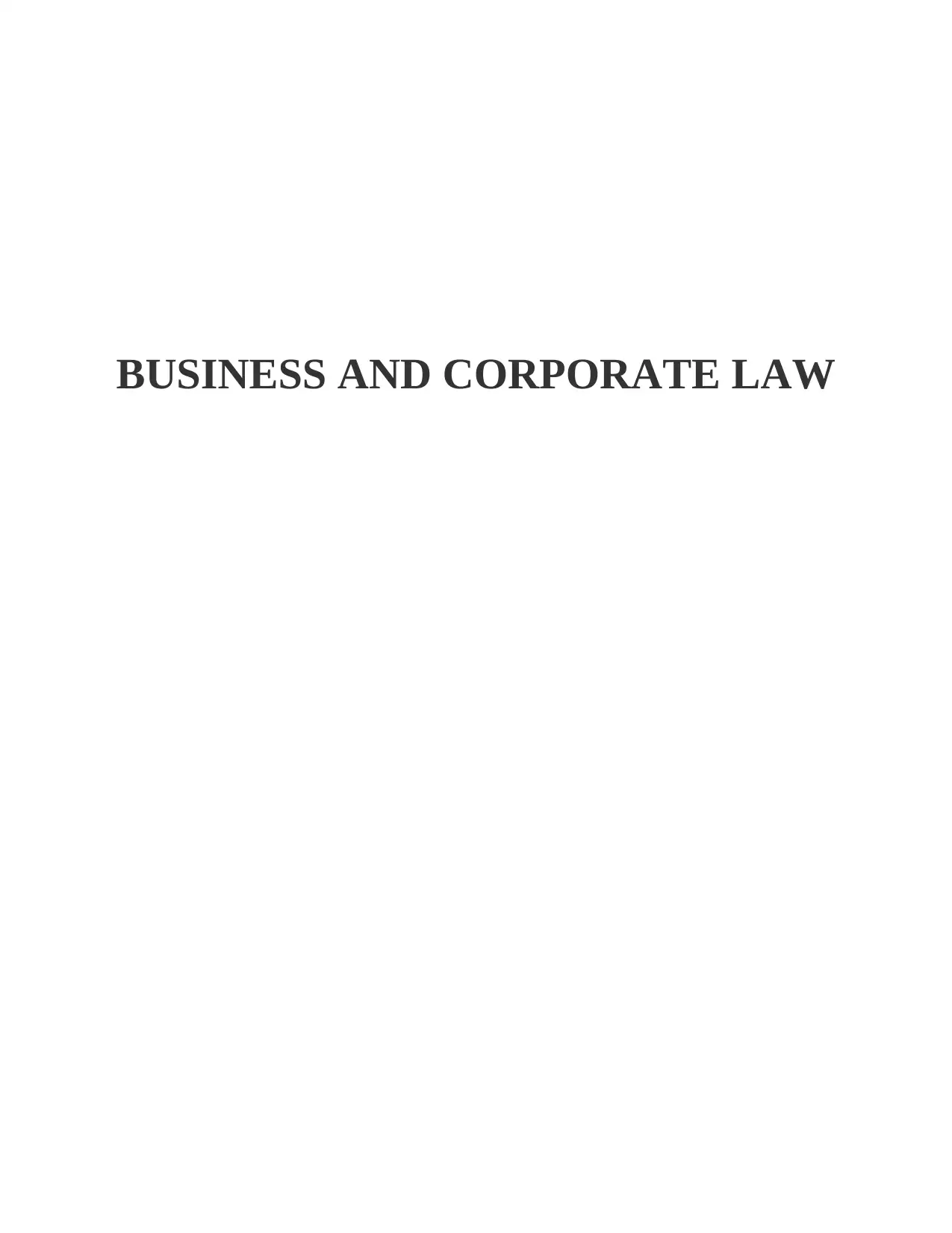
BUSINESS AND CORPORATE LAW
Paraphrase This Document
Need a fresh take? Get an instant paraphrase of this document with our AI Paraphraser
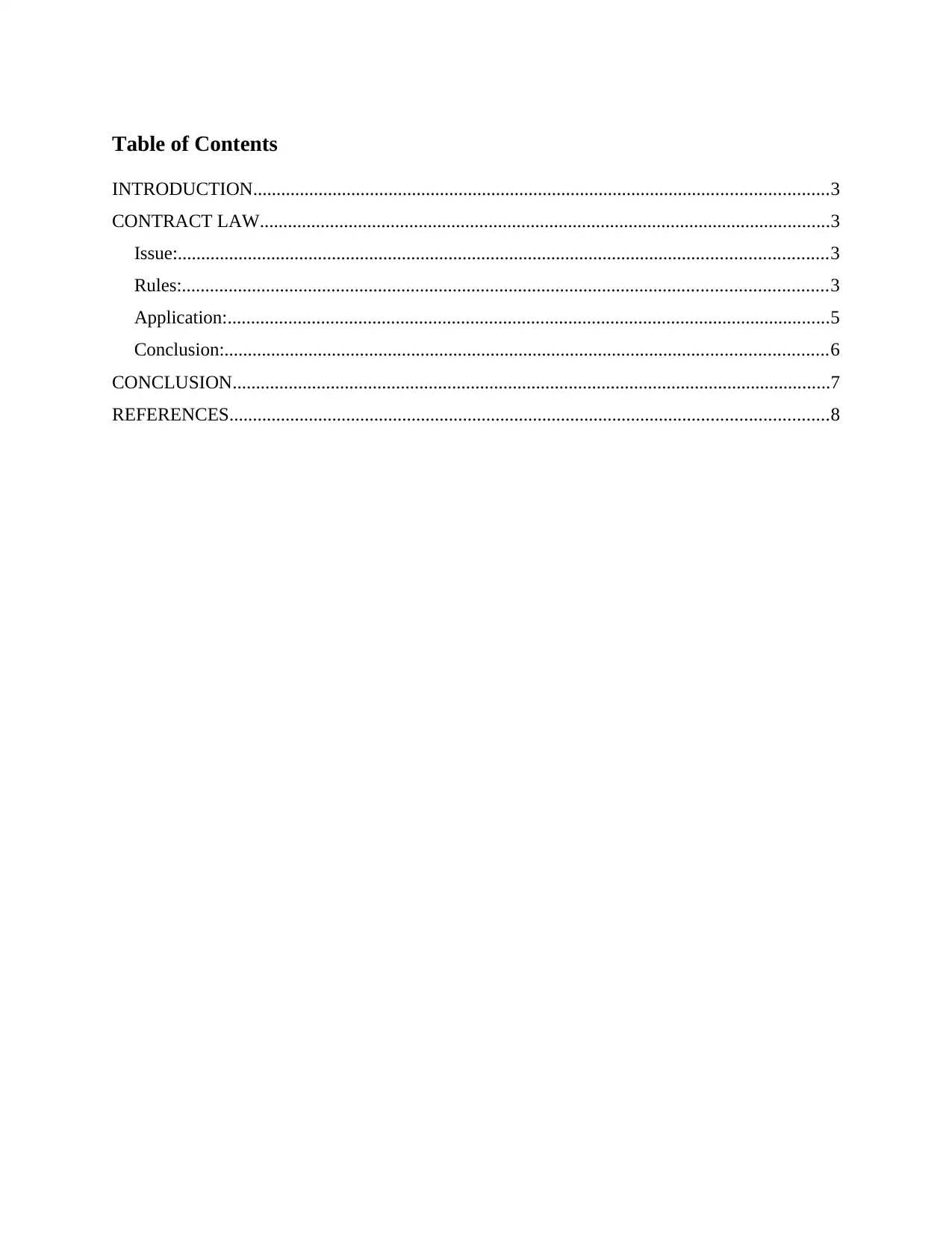
Table of Contents
INTRODUCTION...........................................................................................................................3
CONTRACT LAW..........................................................................................................................3
Issue:...........................................................................................................................................3
Rules:..........................................................................................................................................3
Application:.................................................................................................................................5
Conclusion:.................................................................................................................................6
CONCLUSION................................................................................................................................7
REFERENCES................................................................................................................................8
INTRODUCTION...........................................................................................................................3
CONTRACT LAW..........................................................................................................................3
Issue:...........................................................................................................................................3
Rules:..........................................................................................................................................3
Application:.................................................................................................................................5
Conclusion:.................................................................................................................................6
CONCLUSION................................................................................................................................7
REFERENCES................................................................................................................................8
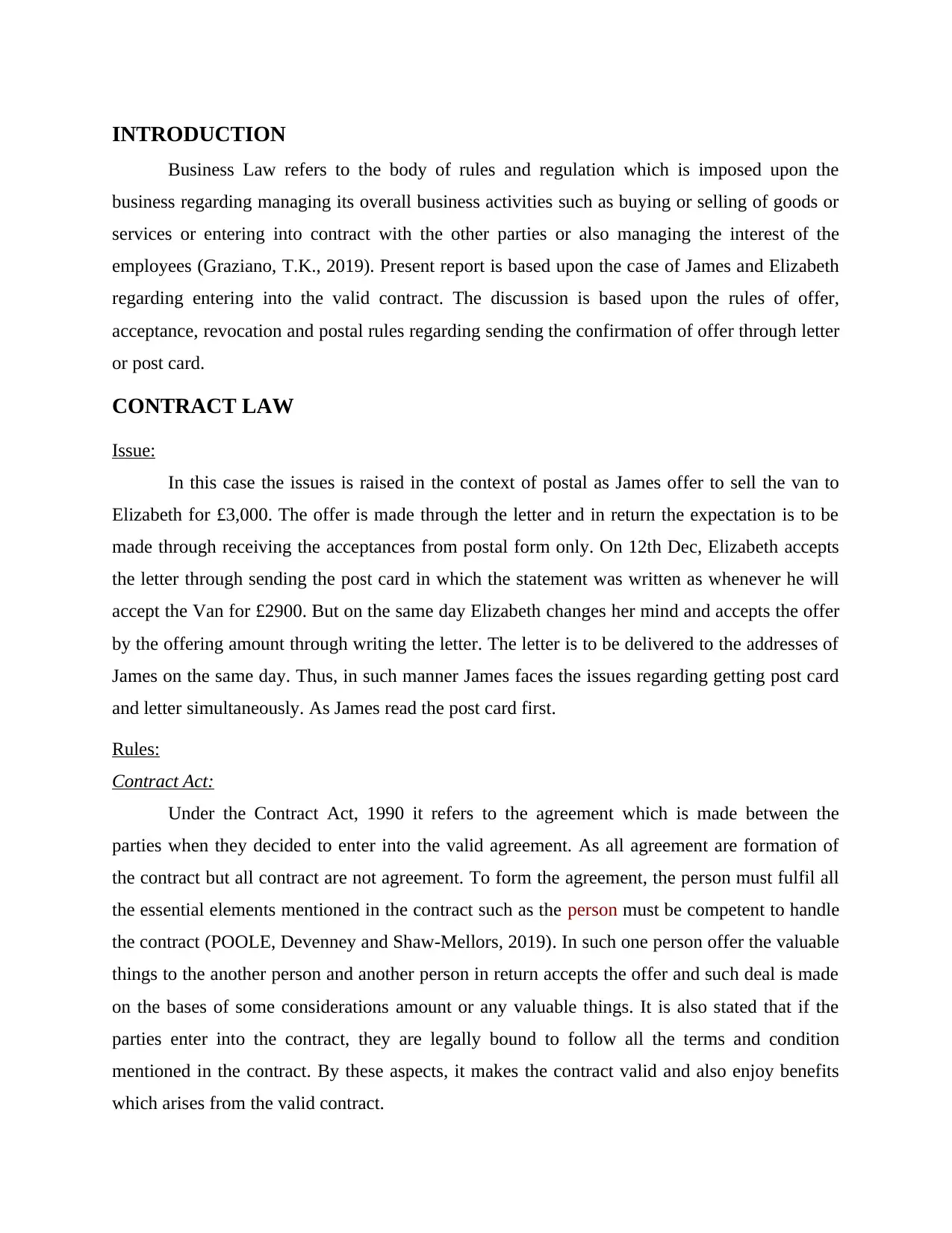
INTRODUCTION
Business Law refers to the body of rules and regulation which is imposed upon the
business regarding managing its overall business activities such as buying or selling of goods or
services or entering into contract with the other parties or also managing the interest of the
employees (Graziano, T.K., 2019). Present report is based upon the case of James and Elizabeth
regarding entering into the valid contract. The discussion is based upon the rules of offer,
acceptance, revocation and postal rules regarding sending the confirmation of offer through letter
or post card.
CONTRACT LAW
Issue:
In this case the issues is raised in the context of postal as James offer to sell the van to
Elizabeth for £3,000. The offer is made through the letter and in return the expectation is to be
made through receiving the acceptances from postal form only. On 12th Dec, Elizabeth accepts
the letter through sending the post card in which the statement was written as whenever he will
accept the Van for £2900. But on the same day Elizabeth changes her mind and accepts the offer
by the offering amount through writing the letter. The letter is to be delivered to the addresses of
James on the same day. Thus, in such manner James faces the issues regarding getting post card
and letter simultaneously. As James read the post card first.
Rules:
Contract Act:
Under the Contract Act, 1990 it refers to the agreement which is made between the
parties when they decided to enter into the valid agreement. As all agreement are formation of
the contract but all contract are not agreement. To form the agreement, the person must fulfil all
the essential elements mentioned in the contract such as the person must be competent to handle
the contract (POOLE, Devenney and Shaw-Mellors, 2019). In such one person offer the valuable
things to the another person and another person in return accepts the offer and such deal is made
on the bases of some considerations amount or any valuable things. It is also stated that if the
parties enter into the contract, they are legally bound to follow all the terms and condition
mentioned in the contract. By these aspects, it makes the contract valid and also enjoy benefits
which arises from the valid contract.
Business Law refers to the body of rules and regulation which is imposed upon the
business regarding managing its overall business activities such as buying or selling of goods or
services or entering into contract with the other parties or also managing the interest of the
employees (Graziano, T.K., 2019). Present report is based upon the case of James and Elizabeth
regarding entering into the valid contract. The discussion is based upon the rules of offer,
acceptance, revocation and postal rules regarding sending the confirmation of offer through letter
or post card.
CONTRACT LAW
Issue:
In this case the issues is raised in the context of postal as James offer to sell the van to
Elizabeth for £3,000. The offer is made through the letter and in return the expectation is to be
made through receiving the acceptances from postal form only. On 12th Dec, Elizabeth accepts
the letter through sending the post card in which the statement was written as whenever he will
accept the Van for £2900. But on the same day Elizabeth changes her mind and accepts the offer
by the offering amount through writing the letter. The letter is to be delivered to the addresses of
James on the same day. Thus, in such manner James faces the issues regarding getting post card
and letter simultaneously. As James read the post card first.
Rules:
Contract Act:
Under the Contract Act, 1990 it refers to the agreement which is made between the
parties when they decided to enter into the valid agreement. As all agreement are formation of
the contract but all contract are not agreement. To form the agreement, the person must fulfil all
the essential elements mentioned in the contract such as the person must be competent to handle
the contract (POOLE, Devenney and Shaw-Mellors, 2019). In such one person offer the valuable
things to the another person and another person in return accepts the offer and such deal is made
on the bases of some considerations amount or any valuable things. It is also stated that if the
parties enter into the contract, they are legally bound to follow all the terms and condition
mentioned in the contract. By these aspects, it makes the contract valid and also enjoy benefits
which arises from the valid contract.
⊘ This is a preview!⊘
Do you want full access?
Subscribe today to unlock all pages.

Trusted by 1+ million students worldwide
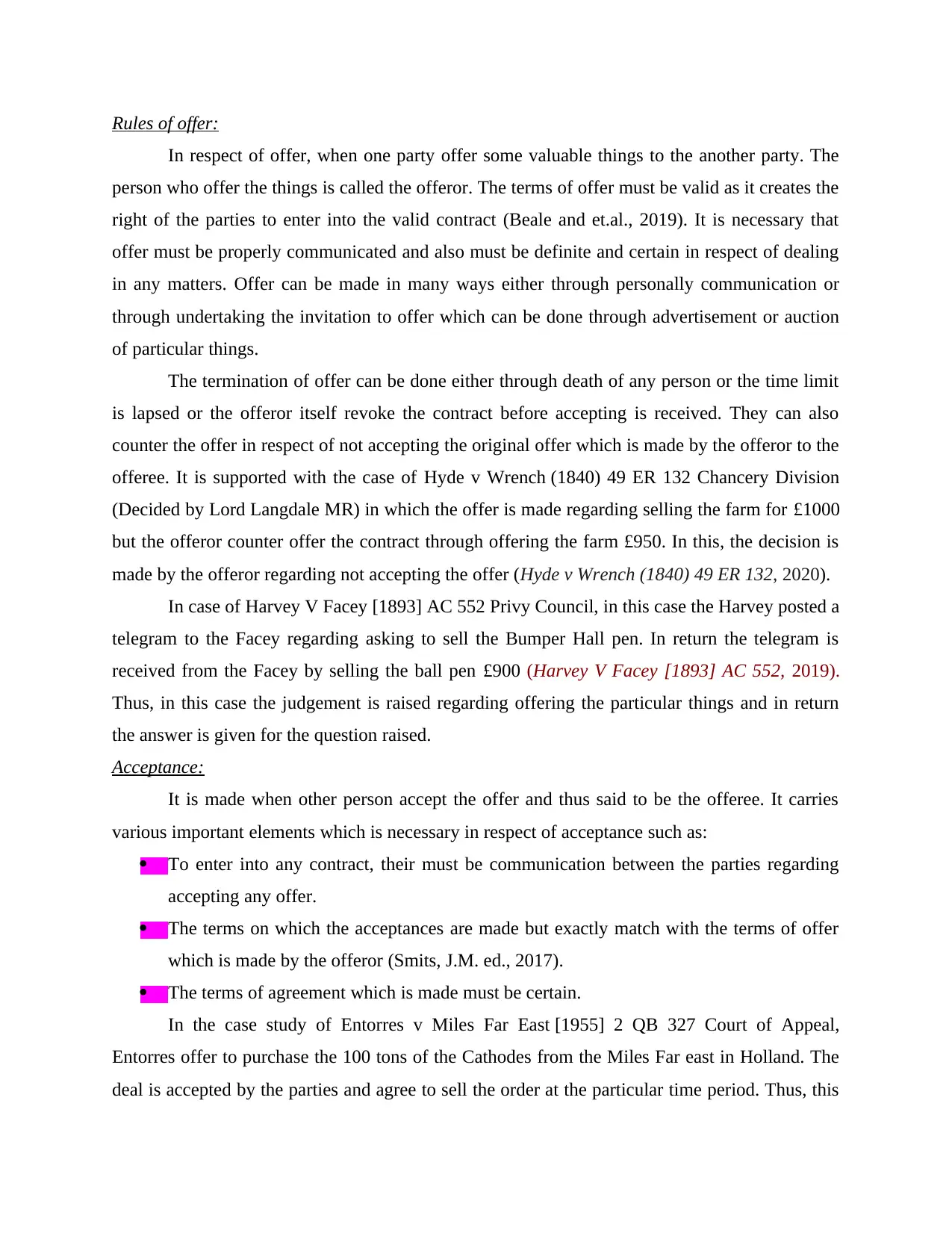
Rules of offer:
In respect of offer, when one party offer some valuable things to the another party. The
person who offer the things is called the offeror. The terms of offer must be valid as it creates the
right of the parties to enter into the valid contract (Beale and et.al., 2019). It is necessary that
offer must be properly communicated and also must be definite and certain in respect of dealing
in any matters. Offer can be made in many ways either through personally communication or
through undertaking the invitation to offer which can be done through advertisement or auction
of particular things.
The termination of offer can be done either through death of any person or the time limit
is lapsed or the offeror itself revoke the contract before accepting is received. They can also
counter the offer in respect of not accepting the original offer which is made by the offeror to the
offeree. It is supported with the case of Hyde v Wrench (1840) 49 ER 132 Chancery Division
(Decided by Lord Langdale MR) in which the offer is made regarding selling the farm for £1000
but the offeror counter offer the contract through offering the farm £950. In this, the decision is
made by the offeror regarding not accepting the offer (Hyde v Wrench (1840) 49 ER 132, 2020).
In case of Harvey V Facey [1893] AC 552 Privy Council, in this case the Harvey posted a
telegram to the Facey regarding asking to sell the Bumper Hall pen. In return the telegram is
received from the Facey by selling the ball pen £900 (Harvey V Facey [1893] AC 552, 2019).
Thus, in this case the judgement is raised regarding offering the particular things and in return
the answer is given for the question raised.
Acceptance:
It is made when other person accept the offer and thus said to be the offeree. It carries
various important elements which is necessary in respect of acceptance such as:
To enter into any contract, their must be communication between the parties regarding
accepting any offer.
The terms on which the acceptances are made but exactly match with the terms of offer
which is made by the offeror (Smits, J.M. ed., 2017).
The terms of agreement which is made must be certain.
In the case study of Entorres v Miles Far East [1955] 2 QB 327 Court of Appeal,
Entorres offer to purchase the 100 tons of the Cathodes from the Miles Far east in Holland. The
deal is accepted by the parties and agree to sell the order at the particular time period. Thus, this
In respect of offer, when one party offer some valuable things to the another party. The
person who offer the things is called the offeror. The terms of offer must be valid as it creates the
right of the parties to enter into the valid contract (Beale and et.al., 2019). It is necessary that
offer must be properly communicated and also must be definite and certain in respect of dealing
in any matters. Offer can be made in many ways either through personally communication or
through undertaking the invitation to offer which can be done through advertisement or auction
of particular things.
The termination of offer can be done either through death of any person or the time limit
is lapsed or the offeror itself revoke the contract before accepting is received. They can also
counter the offer in respect of not accepting the original offer which is made by the offeror to the
offeree. It is supported with the case of Hyde v Wrench (1840) 49 ER 132 Chancery Division
(Decided by Lord Langdale MR) in which the offer is made regarding selling the farm for £1000
but the offeror counter offer the contract through offering the farm £950. In this, the decision is
made by the offeror regarding not accepting the offer (Hyde v Wrench (1840) 49 ER 132, 2020).
In case of Harvey V Facey [1893] AC 552 Privy Council, in this case the Harvey posted a
telegram to the Facey regarding asking to sell the Bumper Hall pen. In return the telegram is
received from the Facey by selling the ball pen £900 (Harvey V Facey [1893] AC 552, 2019).
Thus, in this case the judgement is raised regarding offering the particular things and in return
the answer is given for the question raised.
Acceptance:
It is made when other person accept the offer and thus said to be the offeree. It carries
various important elements which is necessary in respect of acceptance such as:
To enter into any contract, their must be communication between the parties regarding
accepting any offer.
The terms on which the acceptances are made but exactly match with the terms of offer
which is made by the offeror (Smits, J.M. ed., 2017).
The terms of agreement which is made must be certain.
In the case study of Entorres v Miles Far East [1955] 2 QB 327 Court of Appeal,
Entorres offer to purchase the 100 tons of the Cathodes from the Miles Far east in Holland. The
deal is accepted by the parties and agree to sell the order at the particular time period. Thus, this
Paraphrase This Document
Need a fresh take? Get an instant paraphrase of this document with our AI Paraphraser
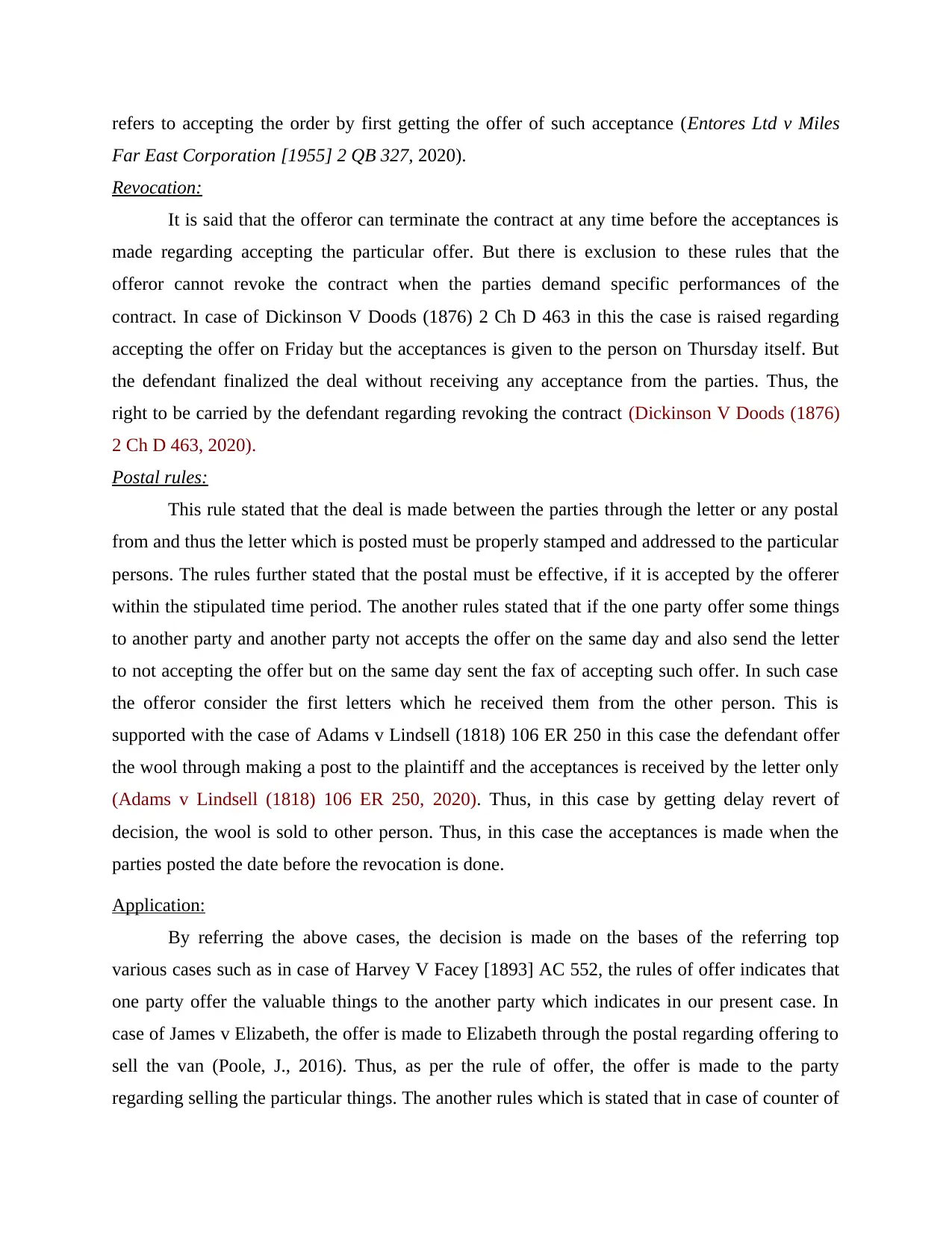
refers to accepting the order by first getting the offer of such acceptance (Entores Ltd v Miles
Far East Corporation [1955] 2 QB 327, 2020).
Revocation:
It is said that the offeror can terminate the contract at any time before the acceptances is
made regarding accepting the particular offer. But there is exclusion to these rules that the
offeror cannot revoke the contract when the parties demand specific performances of the
contract. In case of Dickinson V Doods (1876) 2 Ch D 463 in this the case is raised regarding
accepting the offer on Friday but the acceptances is given to the person on Thursday itself. But
the defendant finalized the deal without receiving any acceptance from the parties. Thus, the
right to be carried by the defendant regarding revoking the contract (Dickinson V Doods (1876)
2 Ch D 463, 2020).
Postal rules:
This rule stated that the deal is made between the parties through the letter or any postal
from and thus the letter which is posted must be properly stamped and addressed to the particular
persons. The rules further stated that the postal must be effective, if it is accepted by the offerer
within the stipulated time period. The another rules stated that if the one party offer some things
to another party and another party not accepts the offer on the same day and also send the letter
to not accepting the offer but on the same day sent the fax of accepting such offer. In such case
the offeror consider the first letters which he received them from the other person. This is
supported with the case of Adams v Lindsell (1818) 106 ER 250 in this case the defendant offer
the wool through making a post to the plaintiff and the acceptances is received by the letter only
(Adams v Lindsell (1818) 106 ER 250, 2020). Thus, in this case by getting delay revert of
decision, the wool is sold to other person. Thus, in this case the acceptances is made when the
parties posted the date before the revocation is done.
Application:
By referring the above cases, the decision is made on the bases of the referring top
various cases such as in case of Harvey V Facey [1893] AC 552, the rules of offer indicates that
one party offer the valuable things to the another party which indicates in our present case. In
case of James v Elizabeth, the offer is made to Elizabeth through the postal regarding offering to
sell the van (Poole, J., 2016). Thus, as per the rule of offer, the offer is made to the party
regarding selling the particular things. The another rules which is stated that in case of counter of
Far East Corporation [1955] 2 QB 327, 2020).
Revocation:
It is said that the offeror can terminate the contract at any time before the acceptances is
made regarding accepting the particular offer. But there is exclusion to these rules that the
offeror cannot revoke the contract when the parties demand specific performances of the
contract. In case of Dickinson V Doods (1876) 2 Ch D 463 in this the case is raised regarding
accepting the offer on Friday but the acceptances is given to the person on Thursday itself. But
the defendant finalized the deal without receiving any acceptance from the parties. Thus, the
right to be carried by the defendant regarding revoking the contract (Dickinson V Doods (1876)
2 Ch D 463, 2020).
Postal rules:
This rule stated that the deal is made between the parties through the letter or any postal
from and thus the letter which is posted must be properly stamped and addressed to the particular
persons. The rules further stated that the postal must be effective, if it is accepted by the offerer
within the stipulated time period. The another rules stated that if the one party offer some things
to another party and another party not accepts the offer on the same day and also send the letter
to not accepting the offer but on the same day sent the fax of accepting such offer. In such case
the offeror consider the first letters which he received them from the other person. This is
supported with the case of Adams v Lindsell (1818) 106 ER 250 in this case the defendant offer
the wool through making a post to the plaintiff and the acceptances is received by the letter only
(Adams v Lindsell (1818) 106 ER 250, 2020). Thus, in this case by getting delay revert of
decision, the wool is sold to other person. Thus, in this case the acceptances is made when the
parties posted the date before the revocation is done.
Application:
By referring the above cases, the decision is made on the bases of the referring top
various cases such as in case of Harvey V Facey [1893] AC 552, the rules of offer indicates that
one party offer the valuable things to the another party which indicates in our present case. In
case of James v Elizabeth, the offer is made to Elizabeth through the postal regarding offering to
sell the van (Poole, J., 2016). Thus, as per the rule of offer, the offer is made to the party
regarding selling the particular things. The another rules which is stated that in case of counter of
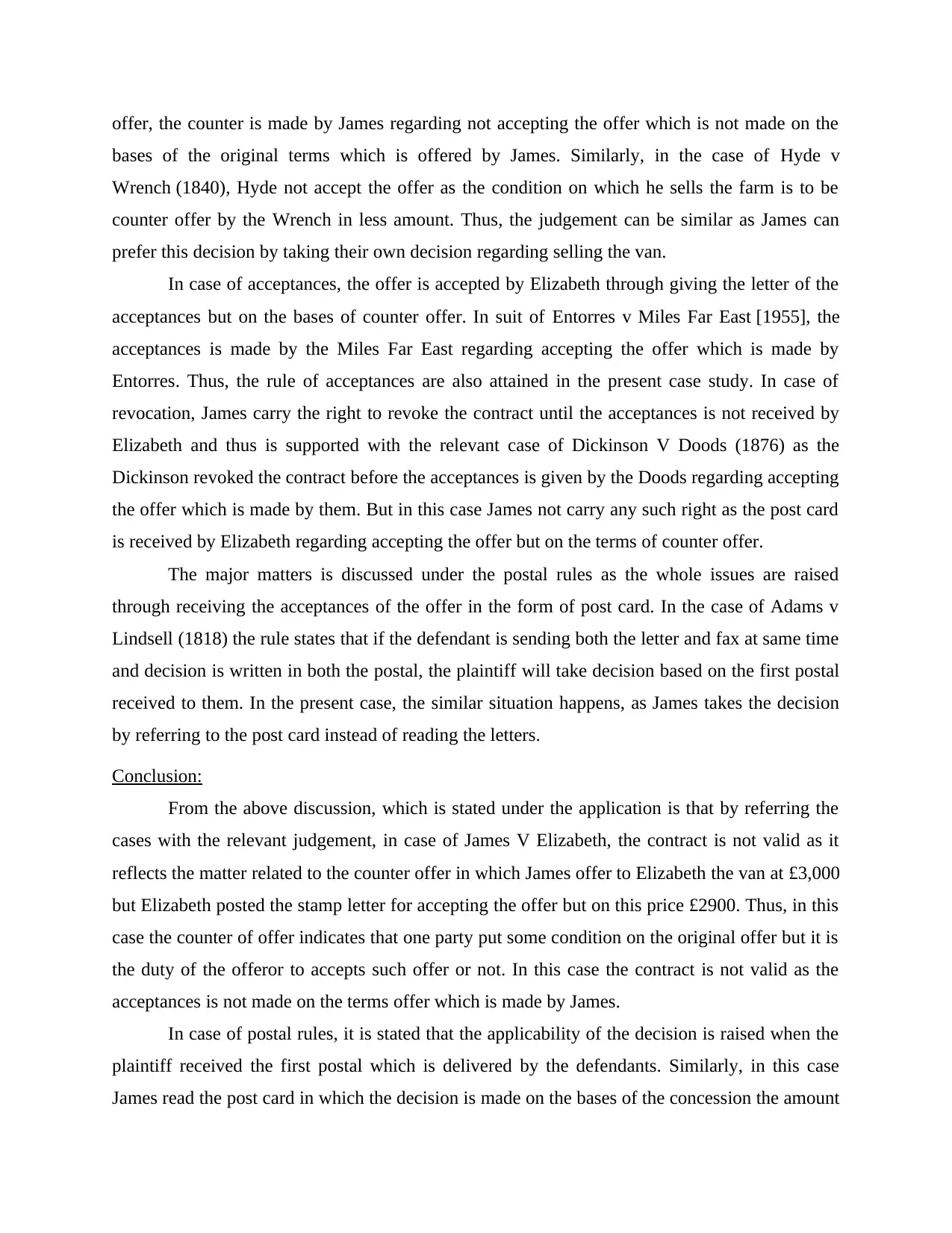
offer, the counter is made by James regarding not accepting the offer which is not made on the
bases of the original terms which is offered by James. Similarly, in the case of Hyde v
Wrench (1840), Hyde not accept the offer as the condition on which he sells the farm is to be
counter offer by the Wrench in less amount. Thus, the judgement can be similar as James can
prefer this decision by taking their own decision regarding selling the van.
In case of acceptances, the offer is accepted by Elizabeth through giving the letter of the
acceptances but on the bases of counter offer. In suit of Entorres v Miles Far East [1955], the
acceptances is made by the Miles Far East regarding accepting the offer which is made by
Entorres. Thus, the rule of acceptances are also attained in the present case study. In case of
revocation, James carry the right to revoke the contract until the acceptances is not received by
Elizabeth and thus is supported with the relevant case of Dickinson V Doods (1876) as the
Dickinson revoked the contract before the acceptances is given by the Doods regarding accepting
the offer which is made by them. But in this case James not carry any such right as the post card
is received by Elizabeth regarding accepting the offer but on the terms of counter offer.
The major matters is discussed under the postal rules as the whole issues are raised
through receiving the acceptances of the offer in the form of post card. In the case of Adams v
Lindsell (1818) the rule states that if the defendant is sending both the letter and fax at same time
and decision is written in both the postal, the plaintiff will take decision based on the first postal
received to them. In the present case, the similar situation happens, as James takes the decision
by referring to the post card instead of reading the letters.
Conclusion:
From the above discussion, which is stated under the application is that by referring the
cases with the relevant judgement, in case of James V Elizabeth, the contract is not valid as it
reflects the matter related to the counter offer in which James offer to Elizabeth the van at £3,000
but Elizabeth posted the stamp letter for accepting the offer but on this price £2900. Thus, in this
case the counter of offer indicates that one party put some condition on the original offer but it is
the duty of the offeror to accepts such offer or not. In this case the contract is not valid as the
acceptances is not made on the terms offer which is made by James.
In case of postal rules, it is stated that the applicability of the decision is raised when the
plaintiff received the first postal which is delivered by the defendants. Similarly, in this case
James read the post card in which the decision is made on the bases of the concession the amount
bases of the original terms which is offered by James. Similarly, in the case of Hyde v
Wrench (1840), Hyde not accept the offer as the condition on which he sells the farm is to be
counter offer by the Wrench in less amount. Thus, the judgement can be similar as James can
prefer this decision by taking their own decision regarding selling the van.
In case of acceptances, the offer is accepted by Elizabeth through giving the letter of the
acceptances but on the bases of counter offer. In suit of Entorres v Miles Far East [1955], the
acceptances is made by the Miles Far East regarding accepting the offer which is made by
Entorres. Thus, the rule of acceptances are also attained in the present case study. In case of
revocation, James carry the right to revoke the contract until the acceptances is not received by
Elizabeth and thus is supported with the relevant case of Dickinson V Doods (1876) as the
Dickinson revoked the contract before the acceptances is given by the Doods regarding accepting
the offer which is made by them. But in this case James not carry any such right as the post card
is received by Elizabeth regarding accepting the offer but on the terms of counter offer.
The major matters is discussed under the postal rules as the whole issues are raised
through receiving the acceptances of the offer in the form of post card. In the case of Adams v
Lindsell (1818) the rule states that if the defendant is sending both the letter and fax at same time
and decision is written in both the postal, the plaintiff will take decision based on the first postal
received to them. In the present case, the similar situation happens, as James takes the decision
by referring to the post card instead of reading the letters.
Conclusion:
From the above discussion, which is stated under the application is that by referring the
cases with the relevant judgement, in case of James V Elizabeth, the contract is not valid as it
reflects the matter related to the counter offer in which James offer to Elizabeth the van at £3,000
but Elizabeth posted the stamp letter for accepting the offer but on this price £2900. Thus, in this
case the counter of offer indicates that one party put some condition on the original offer but it is
the duty of the offeror to accepts such offer or not. In this case the contract is not valid as the
acceptances is not made on the terms offer which is made by James.
In case of postal rules, it is stated that the applicability of the decision is raised when the
plaintiff received the first postal which is delivered by the defendants. Similarly, in this case
James read the post card in which the decision is made on the bases of the concession the amount
⊘ This is a preview!⊘
Do you want full access?
Subscribe today to unlock all pages.

Trusted by 1+ million students worldwide
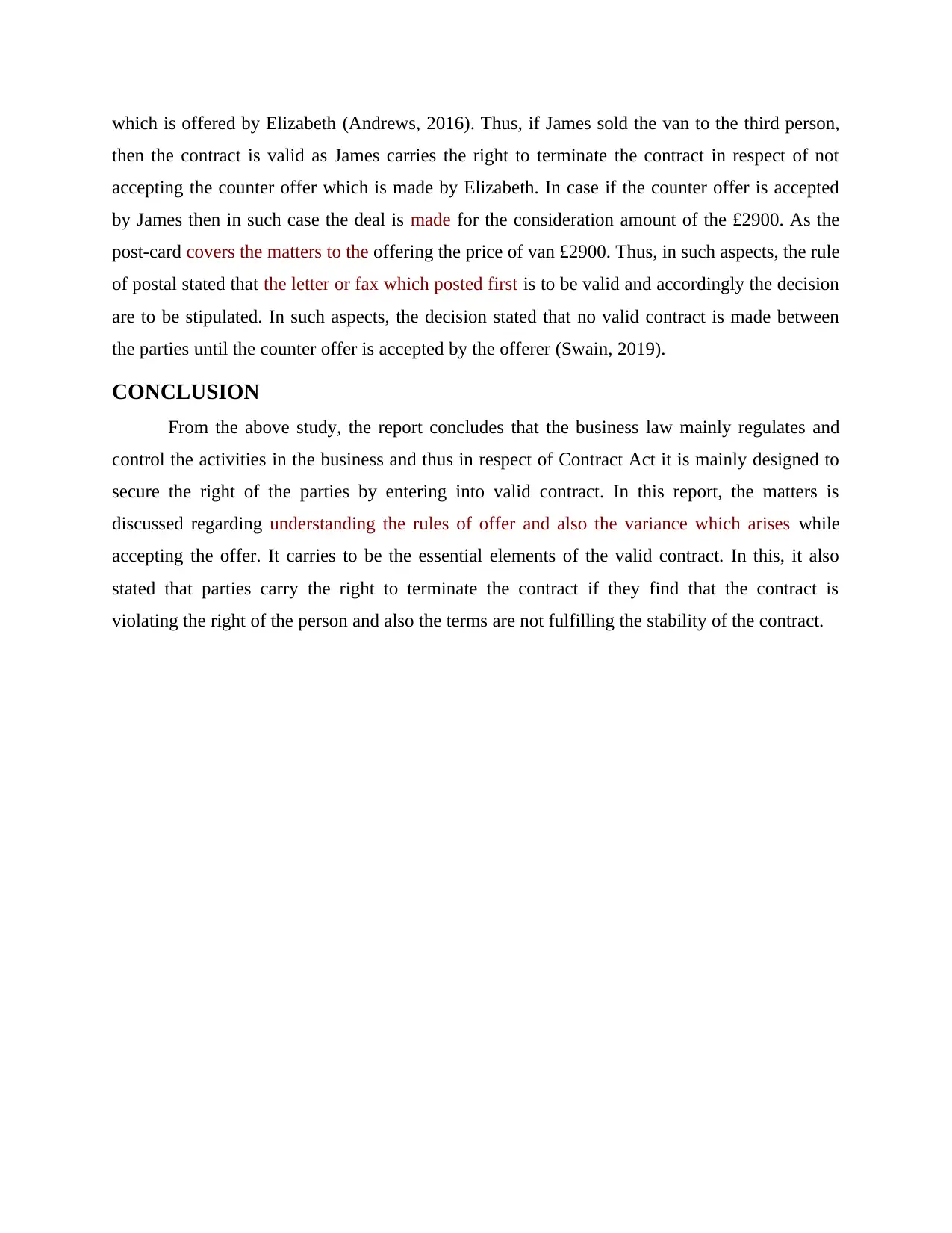
which is offered by Elizabeth (Andrews, 2016). Thus, if James sold the van to the third person,
then the contract is valid as James carries the right to terminate the contract in respect of not
accepting the counter offer which is made by Elizabeth. In case if the counter offer is accepted
by James then in such case the deal is made for the consideration amount of the £2900. As the
post-card covers the matters to the offering the price of van £2900. Thus, in such aspects, the rule
of postal stated that the letter or fax which posted first is to be valid and accordingly the decision
are to be stipulated. In such aspects, the decision stated that no valid contract is made between
the parties until the counter offer is accepted by the offerer (Swain, 2019).
CONCLUSION
From the above study, the report concludes that the business law mainly regulates and
control the activities in the business and thus in respect of Contract Act it is mainly designed to
secure the right of the parties by entering into valid contract. In this report, the matters is
discussed regarding understanding the rules of offer and also the variance which arises while
accepting the offer. It carries to be the essential elements of the valid contract. In this, it also
stated that parties carry the right to terminate the contract if they find that the contract is
violating the right of the person and also the terms are not fulfilling the stability of the contract.
then the contract is valid as James carries the right to terminate the contract in respect of not
accepting the counter offer which is made by Elizabeth. In case if the counter offer is accepted
by James then in such case the deal is made for the consideration amount of the £2900. As the
post-card covers the matters to the offering the price of van £2900. Thus, in such aspects, the rule
of postal stated that the letter or fax which posted first is to be valid and accordingly the decision
are to be stipulated. In such aspects, the decision stated that no valid contract is made between
the parties until the counter offer is accepted by the offerer (Swain, 2019).
CONCLUSION
From the above study, the report concludes that the business law mainly regulates and
control the activities in the business and thus in respect of Contract Act it is mainly designed to
secure the right of the parties by entering into valid contract. In this report, the matters is
discussed regarding understanding the rules of offer and also the variance which arises while
accepting the offer. It carries to be the essential elements of the valid contract. In this, it also
stated that parties carry the right to terminate the contract if they find that the contract is
violating the right of the person and also the terms are not fulfilling the stability of the contract.
Paraphrase This Document
Need a fresh take? Get an instant paraphrase of this document with our AI Paraphraser
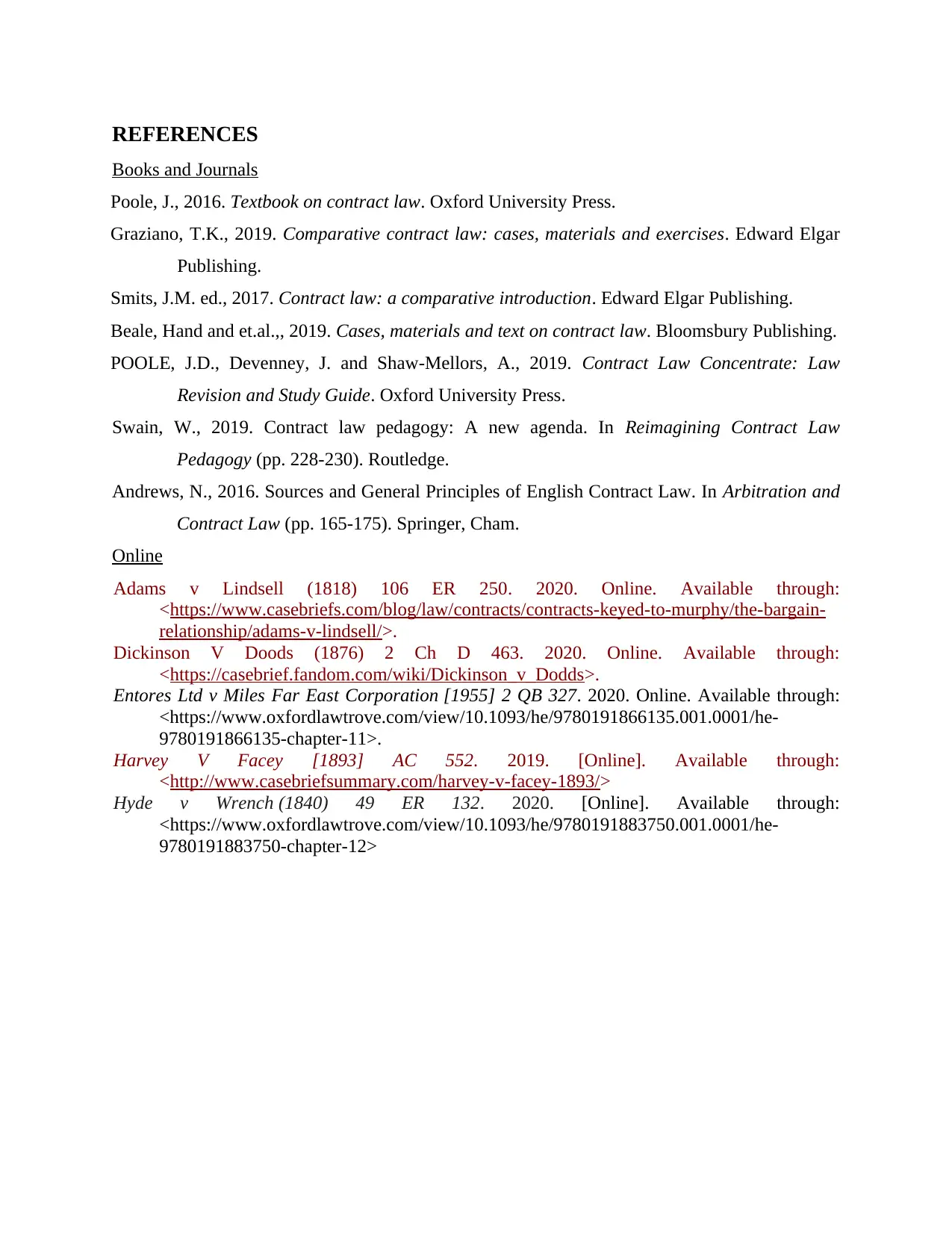
REFERENCES
Books and Journals
Poole, J., 2016. Textbook on contract law. Oxford University Press.
Graziano, T.K., 2019. Comparative contract law: cases, materials and exercises. Edward Elgar
Publishing.
Smits, J.M. ed., 2017. Contract law: a comparative introduction. Edward Elgar Publishing.
Beale, Hand and et.al.,, 2019. Cases, materials and text on contract law. Bloomsbury Publishing.
POOLE, J.D., Devenney, J. and Shaw-Mellors, A., 2019. Contract Law Concentrate: Law
Revision and Study Guide. Oxford University Press.
Swain, W., 2019. Contract law pedagogy: A new agenda. In Reimagining Contract Law
Pedagogy (pp. 228-230). Routledge.
Andrews, N., 2016. Sources and General Principles of English Contract Law. In Arbitration and
Contract Law (pp. 165-175). Springer, Cham.
Online
Adams v Lindsell (1818) 106 ER 250. 2020. Online. Available through:
<https://www.casebriefs.com/blog/law/contracts/contracts-keyed-to-murphy/the-bargain-
relationship/adams-v-lindsell/>.
Dickinson V Doods (1876) 2 Ch D 463. 2020. Online. Available through:
<https://casebrief.fandom.com/wiki/Dickinson_v_Dodds>.
Entores Ltd v Miles Far East Corporation [1955] 2 QB 327. 2020. Online. Available through:
<https://www.oxfordlawtrove.com/view/10.1093/he/9780191866135.001.0001/he-
9780191866135-chapter-11>.
Harvey V Facey [1893] AC 552. 2019. [Online]. Available through:
<http://www.casebriefsummary.com/harvey-v-facey-1893/>
Hyde v Wrench (1840) 49 ER 132. 2020. [Online]. Available through:
<https://www.oxfordlawtrove.com/view/10.1093/he/9780191883750.001.0001/he-
9780191883750-chapter-12>
Books and Journals
Poole, J., 2016. Textbook on contract law. Oxford University Press.
Graziano, T.K., 2019. Comparative contract law: cases, materials and exercises. Edward Elgar
Publishing.
Smits, J.M. ed., 2017. Contract law: a comparative introduction. Edward Elgar Publishing.
Beale, Hand and et.al.,, 2019. Cases, materials and text on contract law. Bloomsbury Publishing.
POOLE, J.D., Devenney, J. and Shaw-Mellors, A., 2019. Contract Law Concentrate: Law
Revision and Study Guide. Oxford University Press.
Swain, W., 2019. Contract law pedagogy: A new agenda. In Reimagining Contract Law
Pedagogy (pp. 228-230). Routledge.
Andrews, N., 2016. Sources and General Principles of English Contract Law. In Arbitration and
Contract Law (pp. 165-175). Springer, Cham.
Online
Adams v Lindsell (1818) 106 ER 250. 2020. Online. Available through:
<https://www.casebriefs.com/blog/law/contracts/contracts-keyed-to-murphy/the-bargain-
relationship/adams-v-lindsell/>.
Dickinson V Doods (1876) 2 Ch D 463. 2020. Online. Available through:
<https://casebrief.fandom.com/wiki/Dickinson_v_Dodds>.
Entores Ltd v Miles Far East Corporation [1955] 2 QB 327. 2020. Online. Available through:
<https://www.oxfordlawtrove.com/view/10.1093/he/9780191866135.001.0001/he-
9780191866135-chapter-11>.
Harvey V Facey [1893] AC 552. 2019. [Online]. Available through:
<http://www.casebriefsummary.com/harvey-v-facey-1893/>
Hyde v Wrench (1840) 49 ER 132. 2020. [Online]. Available through:
<https://www.oxfordlawtrove.com/view/10.1093/he/9780191883750.001.0001/he-
9780191883750-chapter-12>
1 out of 8
Related Documents
Your All-in-One AI-Powered Toolkit for Academic Success.
+13062052269
info@desklib.com
Available 24*7 on WhatsApp / Email
![[object Object]](/_next/static/media/star-bottom.7253800d.svg)
Unlock your academic potential
Copyright © 2020–2026 A2Z Services. All Rights Reserved. Developed and managed by ZUCOL.





